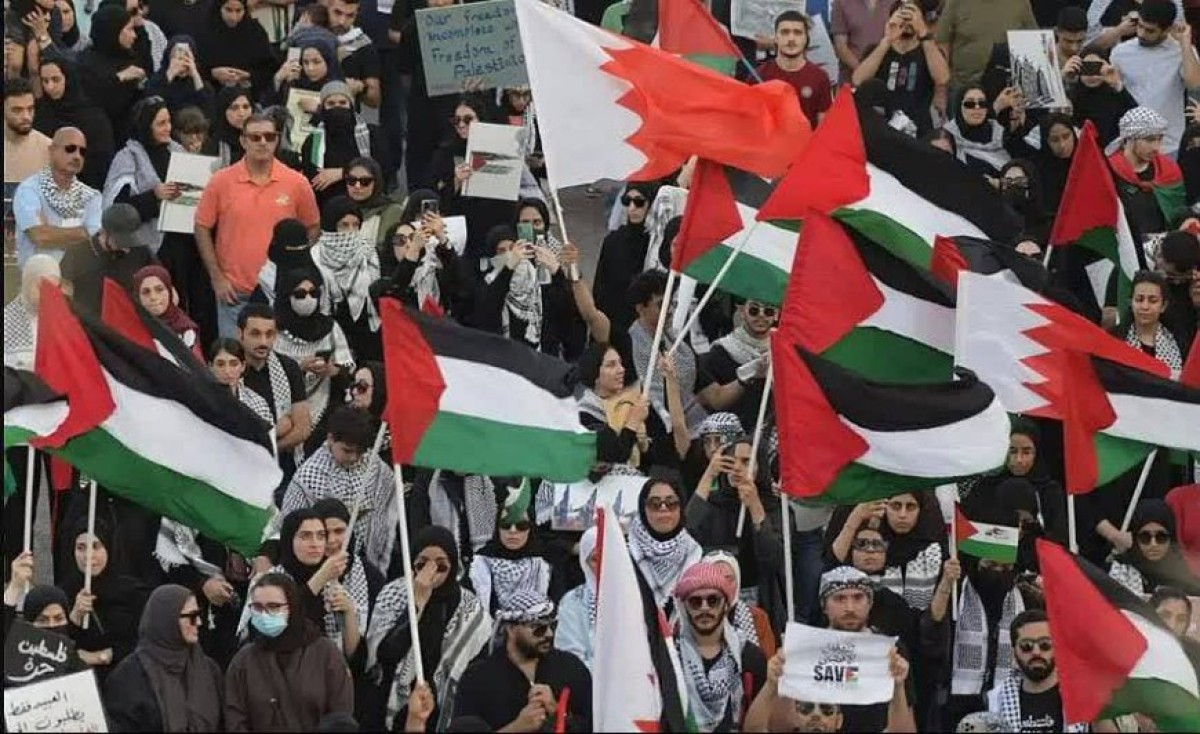 250
250
Operation Al-Aqsa Storm: Normalization Prospects with the Israeli Regime Dim as the Persian Gulf Nations Express Solidarity with Palestinians
The recent series of barbaric assaults by the Israeli regime against the besieged Gaza Strip has widened the division between the Arab nations of the Persian Gulf and their ruling establishments. While the majority of Persian Gulf rulers have limited themselves to lukewarm condemnation of the Israeli atrocities, the nations firmly believe that their governments should exhibit greater solidarity with the Palestinian people by severing all diplomatic and economic ties with Israel.
By: S. Qorbani
The six member states of the Persian Gulf Cooperation Council (PGCC), namely Saudi Arabia, the United Arab Emirates, Qatar, Oman, Kuwait, and Bahrain, find themselves diverging on the issue of the recent Gaza conflict, among other matters. Initially, their responses aligned with their previously held positions. For example, the UAE, having normalized relations with the Israeli regime through the 2020 Abraham Accords, stood in solidarity with the Zionists, condemning Hamas for its operation, dubbed "Al-Aqsa Storm," shamelessly categorizing the valiant onslaught by the Palestinian resistance as a grave escalation of tensions.
Qatar, which maintains cautious relations with Israel but has refrained from establishing formal ties, squarely blamed Israel for the surge in violence and called for restraint. Saudi Arabia, positioned politically at the center of this group and having previously engaged in negotiations with the United States to normalize relations with Israel, issued a statement urging both sides to reduce tensions and safeguard civilian lives.
However, after three weeks of the conflict in Gaza and under the weight of the Zionist massacres, as well as mounting pressure from their respective populations, the positions of the PGCC countries have undergone a tangible transformation. The UAE has shifted its focus from criticizing Hamas to castigating Israel's operations in Gaza, actively working towards providing humanitarian aid. Although the UAE has canceled several events to demonstrate support for the Palestinians, certain events, such as the UN climate summit in November, will proceed as planned in the country.
Qatar, acting as a mediator, skillfully utilized its established communication channels with Israel and Hamas, securing the release of several Israeli captives and brokering an agreement between Israel, Hamas, and Egypt (in coordination with the United States). This agreement permits the departure of foreigners and Palestinians in serious medical condition from Gaza.
In Bahrain, a nation that normalized relations with Israel in 2020, citizens took to the streets, organizing a march to demand an end to diplomatic relations with Israel. Calls for boycotting American brands, including McDonald's, reverberate across the Arab nation, reflecting growing resentment towards the United States as the primary supporter of the Israeli regime.
Contrarily, the Saudi Arabian government, rather than canceling previously scheduled events as a gesture of solidarity with the Palestinians, continues to act as if nothing has occurred. Upcoming events such as the K-pop festival and the Fifty Cent concert are scheduled to proceed in the coming weeks. Moreover, Saudi Arabia has extended invitations to bankers and capitalists from around the globe for a conference titled "Davos in the Desert."
But in fact, Riyadh grapples with the potential domestic repercussions of the Gaza conflict. While Saudi citizens have not taken to the streets in support of the Palestinians like their counterparts in other Arab countries, it is possible that they are choosing to remain at home out of fear of the state's reprisals, harboring concerns over their government's political stance against the Palestinian resistance. Nevertheless, the palpable indignation among the populace is undeniable and cannot be disregarded by the Saudi authorities.
Saudi officials have publicly condemned Israel's airstrikes on Gaza, calling for an end to the siege, an immediate ceasefire, and aid for the Palestinians. However, some observers claim to have detected signals suggesting that the Saudi government does not wholeheartedly welcome demonstrations of pro-Palestinian sentiment in Saudi streets. For instance, when a player from the Al-Hilal football club displayed the Palestinian flag at the end of a match, it elicited a negative reaction from Saudi state media.
Undoubtedly, the ramifications of Operation Al-Aqsa Storm will significantly impede any ongoing negotiations for normalization between Israel and Saudi Arabia, as well as other PGCC states, at least in the foreseeable future.
Furthermore, Operation Al-Aqsa Storm has reinforced the notion that all attempts at normalization by Arab countries with Tel Aviv will fall short of resolving the Palestinian conflict or fostering peace and stability in the region.
In conclusion, the prevailing circumstances have compelled the PGCC governments, owing to the mounting social discontent, to refrain from engaging in negotiations aimed at normalizing relations with the Israeli regime. In their public addresses, these governments express support for the Palestinians and condemn the war crimes perpetrated by the Israeli regime. However, the Muslim citizens of these countries firmly believe that their governments must take concrete action and offer extensive support to their Palestinian brethren. Failure to do so is perceived as neutrality, which is tantamount to endorsing the Israeli oppressors.
 250
250
Comment
Post a comment for this article